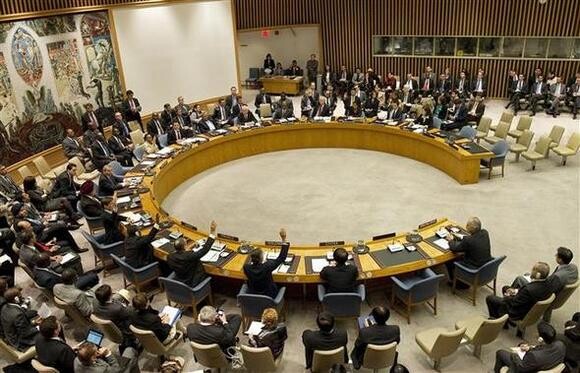hankyoreh
Links to other country sites 다른 나라 사이트 링크
South Korea joins UN Security Council

By Kim Kyu-won, staff reporter
South Korea won a non-permanent seat on the United Nations Security Council (UNSC) on Oct. 19 for the second time after holding a similar position in 1996.
South Korea was elected to a two-year term as a non-permanent member state between 2013 and 2014 at the UNSC elections held at UN headquarters in New York. Picking up this seat, South Korea is expected to have a stronger right to speak on North Korean issues that are subject to UNSC’s sanctions.
In the secondary ballot, South Korea won 149 votes, 21 more than 128 (two-thirds of all votes) needed, beating Cambodia, which got 43 votes.
Foreign Minister Kim Sung-hwan in remarks to the press said, “Now we can participate in debates on North Korean issues as a member of the UN Security Council, I believe we have acquired a significant deterrent power over the North.”
Concerning the possibility that the territorial and historical issues of Northeast Asia may be addressed at the UNSC, the minister said, “Territorial issues are something that should be resolved bilaterally, not multilaterally at the UN.” In regards to the issue of reform of the UNSC including five permanent seats, Kim responded, “We’ll be continuously participating in debates with other countries that share common aims with us including Uniting for Consensus (UFC).”
South Korea became a UN member state at the same time as North Korea in 1991 and served as a non-permanent member on the UNSC for 1996-1997, and held the Presidency of the 56th Session of the General Assembly in 2001. In 2006, former Foreign Minister Ban Ki-moon was elected as the Secretary-General of the UN, and reelected in 2011.
There are 15 members of the UNSC, consisting of five veto-wielding permanent members including the US, UK, France, China, and Russia and 10 elected non-permanent members with two-year terms. Member countries assume the presidency for one month on a rotating basis. The South Korean government is expected to hold the presidency twice during its two-year term, once in February and again at a later date.
Please direct questions or comments to [englishhani@hani.co.kr]

Editorial・opinion
![[Column] Season 2 of special prosecutor probe may be coming to Korea soon [Column] Season 2 of special prosecutor probe may be coming to Korea soon](https://flexible.img.hani.co.kr/flexible/normal/500/300/imgdb/original/2024/0426/3317141030699447.jpg) [Column] Season 2 of special prosecutor probe may be coming to Korea soon
[Column] Season 2 of special prosecutor probe may be coming to Korea soon![[Column] Park Geun-hye déjà vu in Yoon Suk-yeol [Column] Park Geun-hye déjà vu in Yoon Suk-yeol](https://flexible.img.hani.co.kr/flexible/normal/500/300/imgdb/original/2024/0424/651713945113788.jpg) [Column] Park Geun-hye déjà vu in Yoon Suk-yeol
[Column] Park Geun-hye déjà vu in Yoon Suk-yeol- [Editorial] New weight of N. Korea’s nuclear threats makes dialogue all the more urgent
- [Guest essay] The real reason Korea’s new right wants to dub Rhee a founding father
- [Column] ‘Choson’: Is it time we start referring to N. Korea in its own terms?
- [Editorial] Japan’s rewriting of history with Korea has gone too far
- [Column] The president’s questionable capacity for dialogue
- [Column] Are chaebol firms just pizza pies for families to divvy up as they please?
- [Column] Has Korea, too, crossed the Rubicon on China?
- [Correspondent’s column] In Japan’s alliance with US, echoes of its past alliances with UK
Most viewed articles
- 1Division commander ordered troops to enter raging flood waters before Marine died, survivor says
- 2‘We must say no’: Seoul defense chief on Korean, USFK involvement in hypothetical Taiwan crisis
- 3Is N. Korea threatening to test nukes in response to possible new US-led sanctions body?
- 4No good, very bad game for Korea puts it out of Olympics for first time since 1988
- 5Korea’s 1.3% growth in Q1 signals ‘textbook’ return to growth, says government
- 6US overtakes China as Korea’s top export market, prompting trade sanction jitters
- 7[Column] Has Korea, too, crossed the Rubicon on China?
- 8[Column] ‘Choson’: Is it time we start referring to N. Korea in its own terms?
- 9Will NewJeans end up collateral damage in internal feud at K-pop juggernaut Hybe?
- 10Samsung subcontractor worker commits suicide from work stress